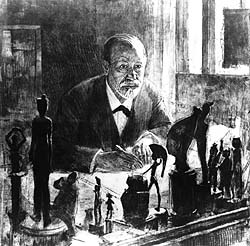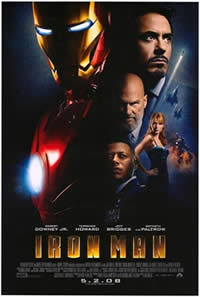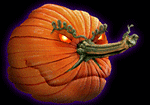
Zombos Says: Excellent
So...this guy, Hal Chester, messed up the
screenplay quite a bit. It was so good, the screenplay, that it couldn't be
completely destroyed, only half destroyed. It's still considered a good movie.
I think the job Jacques Tourneur did with what Hal Chester gave him was awfully
good. Hal Chester, as far as I'm concerned, if he walked up my driveway right
now, I'd shoot him dead. (Charles Bennett, quoted in Backstory 1: Interviews with Screenwriter's of Hollywood's Golden Age)
It's funny how the same mainstream script-to-screen development
journey is undertaken again and again: script gets written, then gets rewritten
by Hollywood-type (sometimes plural) who sticks his or her two cents in while
pinching every other penny out of production, usually creating a penny-wise but
pound foolish cinematic disappointment.
In the case of one film, Night of the Demon (or the
shortened version, Curse of
the Demon, for the United States), the script actually survives
"improvements" by said Hollywood-type—Hal E. Chester—and the vexing Bureau of British Film
Censors, to become an effective supernatural chiller in spite of the
Woolworth's bargain basement special effects involving a beautiful-in concept,
godawful in execution, puppet demon, and bad-boy drinking habits of one
American actor determined to climb inside an empty bottle of booze head first.
Of all the remakes, reworks, and re-imagines circulating Hollywood these days,
this little cult gem of supernatural horror really deserves renewed attention.
But did Hal E. Chester or the censors really hurt the film?
Or did they inadvertently help polish it into a tidy,
tension-mounting story showing how psychologist and paranormal debunker John
Holden steps into it, only to realize what's sticking to his shoe is real and
hairy and cannot be rationally explained away by science?
That the traditionally structured Night of the Demon was
produced at all is surprising. Hammer Films, at the same time, was moving away
from the don't show, just hint intentional ambiguity of Jacques
Tourneur's noir terrors in favor of the brighter, bloodier, mush your face in
it gasps of Curse of Frankenstein, which was not ambiguous at all. When Night
was released in America it was even double-billed with Terrence Fischer's Revenge
of Frankenstein, providing audiences with quite the Mutt and Jeff of horror
opposites in visual and intellectual involvement, but keeping one similarity:
neither movie was ambiguous.
Contrary to Jacques Tourneur's preference for implicative events
and obfuscating shadows to force uncertainty of what's really happening and a
did-I-see-what-I-just-saw? feeling, there is no doubt whatsoever a fire demon
is coming to horribly mangle one, very skeptical, Dr. John Holden (Dana
Andrews) for daring to expose devil-cult leader—and part-time children's
magician—Karswell (Niall MacGinnis).
Within the opening minutes we race along with Harrington, the
doomed predecessor to Holden, as he frantically tries to undo the curse brought
about by the passing of a slip of paper to him, written with Runic symbols,
marking him for gruesome death. We are introduced to the power Karswell wields
and, in no uncertain terms, the reality of the fire demon summoned by his
command. To Harrington's horror it first appears as twinkling lights, then
emerges from an eerie unfolding cloud of smoke among the trees to be seen—by us—as
a poorly executed puppet that looks like it's pedaling on a bicycle toward him
(but is actually being pulled on a dolly toward the camera).
Composer Clifton Parker's otherwise effective scoring is
compromised here by a rapidly repeating screech, sounding much like squeaking
bicycle wheels going round and round (similar to the sound the giant ants make
in Them!), unintentionally reinforcing the
demon-on-a-bike impression. But it's the building tension in Tourneur's deft
direction that surmounts this less than stellar physical effect, while the
jarring rough cut close-up of the demon's ghastly face (added when Tourneur
wasn't looking, I'm sure since he would have none of that), creates the
defining monster image that lingers in the mind long afterwards.
Based on M.R. James's short story, Casting the Runes,
screenwriters Charles Bennett, Cy Endfield, and Hal E. Chester (co-producer of The
Beast From 20,000 Fathoms), expand the story using the "magic 3 +
R" of scriptwriting: nasty powerful villain, naive male and smart female, and
add dash of unlikely romance between them. It was Chester who insisted on
showing the monster much more than Tourneur intended, in hopes of attracting an
American audience (I know, shame on us for being so demanding, even then).
While Tourneur wanted to create a psychological thriller similar
to his Cat People, Chester wanted no doubt in the audience's mind of the
terror coming by night. Between the two, the story becomes a supernatural
version of 1949's noir D.O.A; although here it's dead-man-walking Holden's
growing realization he's been marked for death propelling the story forward. By
eliminating any doubt the threat is real, we know Holden is in danger:
but will he realize it? Will his growing suspicion that sometimes a monster
is just a monster, and not a figment of a superstitious imagination or
autosuggestion, galvanize him to action? In this respect, Chester's Night
is truer to James' story than Tourneur would have made it.
Karswell is not all that nasty, either.
In James' story, Karswell is evil through and through, but in Night,
Karswell has his softer side (he gives a children's magic show each Halloween).
He is also secretly fearful. In a revealing speech, unwisely cut from the
American version, he chastises his kindly mother for not realizing the
predicament he's in:
Karswell-
You get nothing for nothing. Listen, mother. You believe in the supernatural.
I've shown you some of its power and some of its danger.
Mrs. Karswell-
Yes, Julian.
Karswell-
Well, believe this also. You get nothing for nothing. This house, the land, the
way we live. Nothing for nothing. My followers who pay for this do it out of
fear. And I do what I do out of fear also. It's part of the price.
Mrs. Karswell-
But if it makes you unhappy. Stop it. Give it back.
Karswell-
How can you give back life? I can't stop it. I can't give it back. I can't let
anyone destroy this thing. I must protect myself. Because if it's not someone
else's life, it'll be mine. Do you understand, mother? It'll be mine.
This mum and son chat reveals how much he's stepped in it, too,
but willingly, unlike Holden. Under that calm and commanding veneer lies a man
trapped into doing what he must to keep from being stepped on by something far
nastier and even more powerful.
And that something is coming closer and closer toward Holden every
day. After Karswell surreptitiously passes along the Runic spell, Holden starts
feeling cold all the time, keeps hearing an odd and mournful tune playing in
his head, and smokes and drinks like a fish while Harrington's niece, Joanna
(Peggy Cummins), berates him for being such a non-believing, smug,
chowder-head. She knows how and why her uncle died from reading his journal,
and now she's trying to save Holden from the same fate before it's too late.
Even Mrs. Karswell, against her son's will, wants to help.
In what some critics consider a weakening sidestep from the
mounting tension, she has Joanna bring Holden to a seance she's arranged. The
incredulous psychologist reluctantly joins the proceedings as the medium, Mr.
Meek (Reginald Beckwith), humorously channels his spirit guides until he is
taken over by Joanna's uncle. Harrington's voice, frantically warning of the
coming danger, ending in a shriek of fear as he relives the night of the demon
attack "It's in the trees! It's coming!" Holden, not impressed by the
proceedings, ignores the warning; but uneasiness is beginning to chink his
scientific armor more and more.
Tourneur turns down the light and lengthens the shadows for the
revelation of the little slip of paper in Holden's possession, exactly as
Harrington describes it in his journal. Is it the wind from an open window that
whips the paper from Holden's hands and sends it flying toward the fire on the
hearth, only to be stopped from bursting into flame by the ember screen? Or
does it have a life of its own and desperately tries to reach the fire, even
after he closes the window?
Joanna insists it's alive and is trying to seal his fate by
burning, but Holden tells her it's the draft going up the chimney keeping it
tight against the screen; but as he says that it suddenly drops motionless to
the floor, draft or not. "What made it stop?" asks Joanna. "I
don't know," says Holden, deep in thought, for once without a rational
explanation.
He carefully tucks the paper into his wallet for safekeeping.
More strange events unsettle Holden, forcing him to question his
senses enough to burgle Karswell's house to find answers. A terrifying
encounter with Grimalkin, the Karswell’s familiar and watch-cat, reinforces
Holden's growing concern that he's dealing with things outside the scope of his
understanding. Ignoring Karswell's suggestion to avoid the woods, Holden
becomes more unraveled when the fire demon puts in a brief appearance. Through
the use of diffused light, shadows, and increasingly unexplainable events,
Holden is pushed more and more toward a realization he's still not fully
willing to accept.
The turning point comes when Holden interviews a former cult
member who, having survived Karswell's witchcraft by passing the runic-covered
paper to his brother, is left in catatonic shock. While the scientific
plausibility of the hypnotic session to awaken him is questionable, Tourneur's
direction sums Holden's disquieting supernatural encounters into one riveting
moment of desperate action. He learns enough to know he must return the paper
to Karswell, but can he do it in time?
The final confrontation between Holden and Karswell, two men
frightened and desperate—one anxious to return the paper, the other anxious to
keep it from being returned—moves the film to its smoke-filled, demon demon,
who's going to get the demon? denouement at a brisk pace.
Night of the Demon, while it has its faults (mostly due to budget), rises above them
through its story of a rational, scientific man pitted against the
inexplicable, and Tourneur's noir direction that transitions Holden's
uncertainty to certainty in incremental encounters with an unknown that's
gunning for him while we pray he wakes to the coming danger before it is too
late.





 Cinema tends to reflect either the banality, the sanctity, or the immorality of our times, and patrons of movies promote the ones they like most by buying more theater tickets, more DVDs, and more Netflix rentals for them. The popularity of a movie will invariably foster more movies with similar storylines, similar characters and action themes, and as many sequels as an audience's attention span will allow. In a word, profit drives the creative ups and downs of cinema. From the independent to the mainstream, whether grindhouse or arthouse, the bottom line accounts for most of what we see and hear in the darkened theaters of Cannes, Sheboygan, and points in-between.
Cinema tends to reflect either the banality, the sanctity, or the immorality of our times, and patrons of movies promote the ones they like most by buying more theater tickets, more DVDs, and more Netflix rentals for them. The popularity of a movie will invariably foster more movies with similar storylines, similar characters and action themes, and as many sequels as an audience's attention span will allow. In a word, profit drives the creative ups and downs of cinema. From the independent to the mainstream, whether grindhouse or arthouse, the bottom line accounts for most of what we see and hear in the darkened theaters of Cannes, Sheboygan, and points in-between.
 Zombos Says: Excellent
Zombos Says: Excellent

